Current consulting highlights
Telco concepts for the digitalization of the energy system – reliably manage critical infrastructures
The law on the “digitization of the energy transition” and the increasing number of EEG plants are key reasons for the need to make energy networks “smarter”. Particularly at the lower levels of the grids, this means implementing bidirectional secure M2M communication with the metering points of the consumers or feeders.
At the same time, from a market and technology perspective, there is an increasing need to control so-called network utilities in the future smart grid via (real-time) communication links. All energy suppliers are currently faced with the difficult task of finding the appropriate business model as well as the suitable technology mix or providers for the implementation of these complex and in part very different individual requirements.
Especially the transformation of the control and measurement tasks including the high security requirements into suitable specifications for telecommunication providers is a great challenge, since the requirements vary greatly regionally and per utility.
LATUS consulting has developed specifications for the dimensioning of networks and communication paths on the basis of a proven procedure model for well-known German EVUs. Tool-supported calculation methods allow LATUS consulting to calculate complex hybrid technology scenarios with the detailed requirements (use cases) of each utility and to perform corresponding sensitivity calculations.



